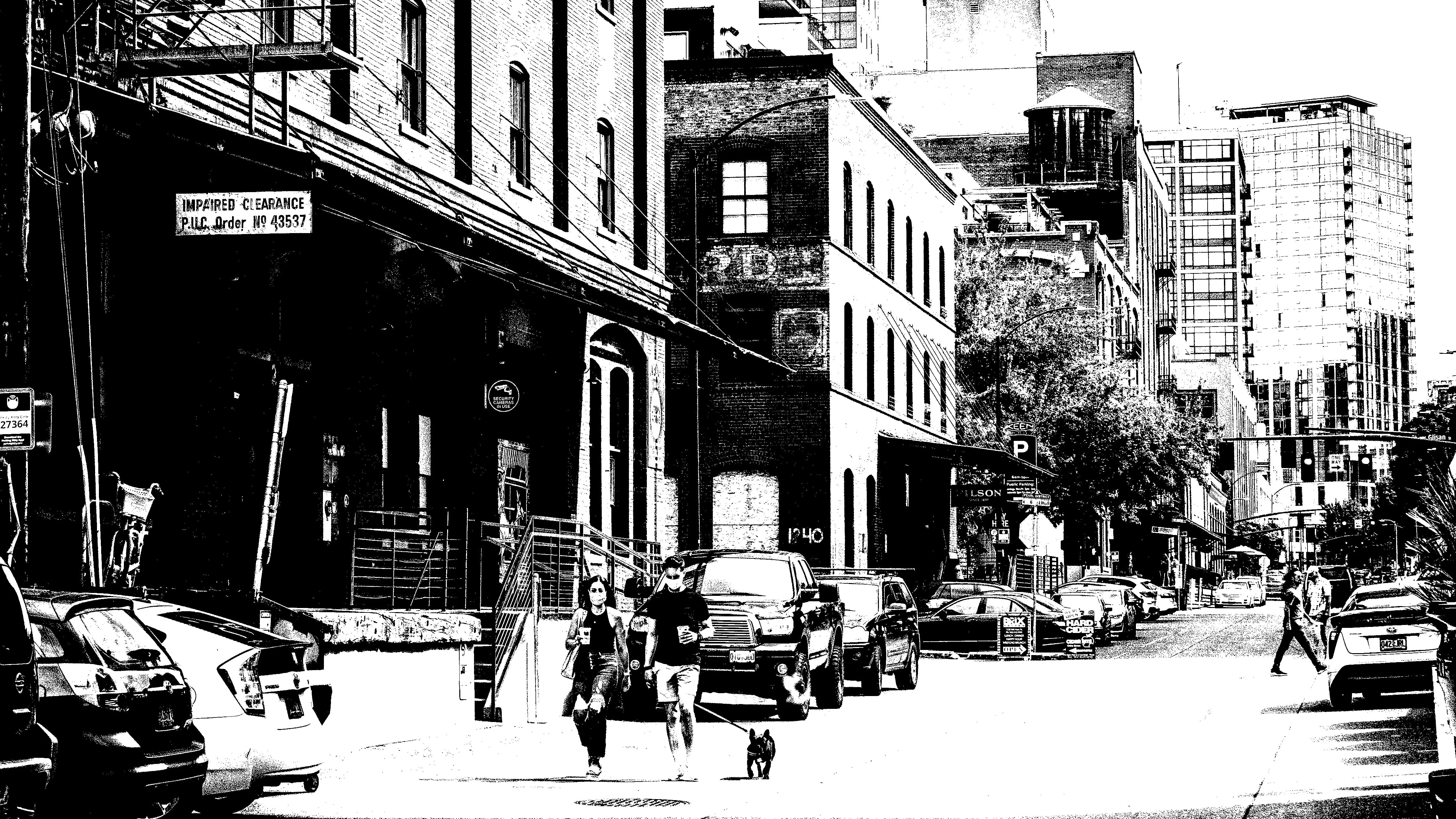Two years ago, Erica Swanson, owner of Tea Bar on Northwest Northrup Street, arrived at her shop to find that someone had shot out two of its 10-foot-tall windows.
Along with a bullet casing and broken glass, the failed break-in attempt left $10,000 worth of damage, a bill that the business had to foot itself. Sadly, the attack was routine. Burglars have tried to break into Tea Bar several times since then. Other merchants tell the same story.
Mary Ellen MacKay, owner of Kanani Pearl Spa on Northwest Marshall Street, says her spa suffered three break-in attempts in 2023. “Up until that point in time, we had no security systems and no problems,” she says. “It’s a sign of the times.”
For more than two decades, times were good in the Pearl, an urban planning gem that turned blocks of disused warehouses into Portland’s equivalent of Soho in New York, or Gastown in Vancouver, B.C. During its heyday, the Pearl was packed with art galleries, high-end restaurants, and boutiques. Kids splashed in the Jamison Square fountain. Well-heeled divorcees prowled the bar at Blue Hour.
Some of that goodness is still there, but the blight that claimed downtown during the pandemic and the George Floyd protests, many of which turned to riots, has crept northward, taking its toll. Starbucks closed a store at Northwest 11th Avenue and Lovejoy Street in October 2022. REI closed its 20-year-old Pearl location, its only outlet within city limits, in February 2024.
Last month, Erath Winery closed its posh urban tasting room on Marshall. The news came the same week that Portland Mayor Keith Wilson opened a what will become a 100-bed homeless shelter a block away, a move that incensed Pearl District residents and business owners, who say it will bring more crime and drugs to an already struggling neighborhood.
One closure may say more about economics in the Pearl than those others. Can Font, the Michelin-recognized restaurant in Spain, opened a Portland location in the Pearl in 2017, bringing Stumptown even more food cred. Can Font drew crowds, says former managing partner Vladimir Zaharchook, but it closed in May because of high taxes, building expenses and insurance, which Can Font paid directly in a “triple net” lease with its landlord. Costs were rising and the Pearl’s charm was dimming, Zaharchook says.
Zaharchook’s landlord was SITE Centers, a Beachwood, Ohio-based real estate investment trust that specializes in open-air retail clusters. In one of the most ill-timed deals ever signed in Portland, SITE Centers bought 44 storefronts at the bases of 10 Pearl District condo towers in late 2019. The first U.S. case of COVID-19 was documented just months later, near Seattle.
Perhaps because they were 2,500 miles away, SITE Centers didn’t understand what it was like to do business in Portland’s Pearl District, post-COVID, post George Floyd, tenants say.
“Honestly, I don’t know how anyone can survive in the area,” Zaharchook says. SITE Centers “was not flexible at all. They didn’t understand what they were doing and how much struggle we had. They didn’t want to help us. They just didn’t care.”
Jason Enders, owner of Visage Eyewear, says he, too, encountered ennui from SITE Centers. Enders opened his eyeglasses store on Northwest Johnson Street in 1999 and became a SITE Centers tenant when it bought his space 10 years later.
“When we negotiated our lease a couple of years ago, you would think they would care to keep a longtime tenant,” Enders tells WW. “They raised the rent, which is a typical thing to do, but given the time you would think, ‘Here is one of the businesses that is still here—maybe we’ll cut them a deal,’ and they were not interested.”
SITE Centers appears to have lost faith in the Pearl. As reported last week by WW, the company recently put all 44 storefronts, accounting for 95,430 square feet, up for sale. All together, the collection is 66.4% leased, according to an offering document.
The Pearl cluster, called The Blocks, is an outlier among SITE Centers’ 32 properties. The company specializes in open-air shopping centers in high-income suburban neighborhoods. The Blocks are open air, and the Pearl is high income, but it’s not suburban.
Chief financial officer Gerry Morgan says SITE Centers doesn’t comment on transactions.
The question now is who will take a chance on SITE Centers’ properties. Progressive members of the Portland City Council this spring discussed levying a vacancy tax on residential and commercial properties to discourage property owners from holding out for higher rents, though the idea appears dormant currently.
Aaron Kirk Douglas, director of market intelligence at HFO Investment Real Estate, says vacancy taxes in other cities have had mixed results. Without more data, Portland risks “creating another regulatory burden” with little benefit, Douglas wrote on HFO’s website in July.
Swanson at Tea Bar worries The Blocks will be a tough sell. “I don’t know who is going to be attracted to buying these storefronts,” she says. “It’s sad to see a lot of spaces vacant.”
The area north of downtown Portland began its transformation from rail yards, warehouses, and an imposing National Guard Armory, into the Pearl District in 1987, when a stretch of Northwest 13th Avenue was listed on the National Register of Historic Places.
In 1994, developer Homer Williams started Hoyt Street Properties, bought 40 acres in the area and, with financial backing from local apartment mogul Joe Weston, began erecting glass condo towers with ground-floor retail spaces. The common areas in residential parts of the buildings passed to owners after enough units sold, but Hoyt Street held onto the retail spaces to retain seats on the buildings’ boards, says Tiffany Sweitzer, who joined Hoyt Street at its founding and has been president since 2000.
“We knew we needed the vibrancy of the retail,” Sweitzer says in an interview.
In 2017, when Portland was thriving, Hoyt Street sold the commercial spaces to local investor ScanlanKemperBard Cos. and Artemis Real Estate Partners, based in Chevy Chase, Md. The pair paid a price in the mid-$30 million range, SKB president Todd Gooding tells WW. Because Hoyt Street had managed the properties as amenities for the condos, SKB, the lead investor on the deal, could raise rents, making the collection more valuable. SKB and Artemis sold it to SITE Centers 30 months later for $50 million.
“It was a pretty good deal,” Gooding says. “We were fortunate.”
MacKay has worked with all the owners. She opened Kanani Pearl Spa on Marshall in 2004, when Hoyt Street Properties owned the building. It was a good landlord, as were Artemis and SKB, she says. MacKay often finds herself reminiscing about the Artemis-SKB days.
“They had an office right in the Pearl, and they gave us a stipend to do improvements on the space,” MacKay says. “SITE Centers came along, and I’ve felt very disconnected. They had no empathy towards small businesses and what we had to go through.”
MacKay sees SITE Centers as nothing more than a portal she uses to pay her rent. The company is slow to respond to damage from break-ins and other issues, she says.
Like many merchants in the Pearl, MacKay says the city’s homeless shelter is opening at an inopportune time for a neighborhood that’s already shouldering more than its share of the homelessness burden, close as it is to downtown and the Willamette riverfront.
Sweitzer, who has been developing the Pearl for three decades, agrees.
“You don’t put people in a shelter from 7 pm to 7 am and then throw them back on the street,” Sweitzer says. “What does that do to a neighborhood?”
Zaharchook, the former partner in Can Font, says Portland should honor the merchants who have stayed open in a high-rent district with a falling quality of life.
“We have to give medals to the people who are left, whose doors are still open,” Zaharchook says. “It’s so much trouble.”


